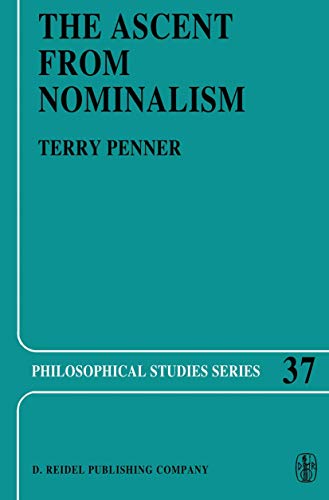Articoli correlati a The Ascent from Nominalism: Some Existence Arguments...

Le informazioni nella sezione "Riassunto" possono far riferimento a edizioni diverse di questo titolo.
Le informazioni nella sezione "Su questo libro" possono far riferimento a edizioni diverse di questo titolo.
- EditoreD Reidel Pub Co
- Data di pubblicazione1987
- ISBN 10 902772427X
- ISBN 13 9789027724274
- RilegaturaCopertina rigida
- Numero di pagine480
Compra nuovo
Scopri di più su questo articolo
Spese di spedizione:
GRATIS
In U.S.A.
I migliori risultati di ricerca su AbeBooks
The Ascent from Nominalism: Some Existence Arguments in Platoâ  s Middle Dialogues (Philosophical Studies Series) by Penner, Terry [Hardcover ]
Descrizione libro Hardcover. Condizione: new. Codice articolo 9789027724274
The Ascent from Nominalism: Some Existence Arguments in Plato?s Middle Dialogues (Philosophical Studies Series, 37)
Descrizione libro Condizione: New. Codice articolo ABLIING23Apr0316110331936
Ascent from Nominalism : Some Existence Arguments in Plato's Middle Dialogues
Descrizione libro Condizione: New. Codice articolo 1220679-n
The Ascent from Nominalism
Descrizione libro Condizione: New. Dieser Artikel ist ein Print on Demand Artikel und wird nach Ihrer Bestellung fuer Sie gedruckt. divisibility in Physics VI. I had been assuming at that time that Aristotle s elimination of reference to the infinitely large in his account of the potential inf inite--like the elimination of the infinitely small from nineteenth century accounts of limits. Codice articolo 5815345
The Ascent from Nominalism
Descrizione libro Buch. Condizione: Neu. This item is printed on demand - it takes 3-4 days longer - Neuware -divisibility in Physics VI. I had been assuming at that time that Aristotle's elimination of reference to the infinitely large in his account of the potential inf inite--like the elimination of the infinitely small from nineteenth century accounts of limits and continuity--gave us everything that was important in a theory of the infinite. Hilbert's paper showed me that this was not obviously so. Suddenly other certainties about Aristotle's (apparently) judicious toning down of (supposed) Platonic extremisms began to crumble. The upshot of work I had been doing earlier on Plato's 'Third Man Argument' began to look different from the way it had before. I was confronted with a possibility I had not till then so much as entertained. What if the more extreme posi tions of Plato on these issues were the more likely to be correct The present work is the first instalment of the result ing reassessment of Plato's metaphysics, and especially of his theory of Forms. It has occupied much of my teaching and scholarly time over the past fifteen years and more. The central question wi th which I concern myself is, 'How does Plato argue for the existence of his Forms (if he does )7' The idea of making this the central question is that if we know how he argues for the existence of Forms, we may get a better sense of what they are. 480 pp. Englisch. Codice articolo 9789027724274
Ascent from Nominalism : Some Existence Arguments in Plato's Middle Dialogues
Descrizione libro Condizione: New. Codice articolo 1220679-n
The Ascent from Nominalism : Some Existence Arguments in Plato's Middle Dialogues
Print on DemandDescrizione libro Condizione: New. PRINT ON DEMAND Book; New; Fast Shipping from the UK. No. book. Codice articolo ria9789027724274_lsuk
The Ascent from Nominalism : Some Existence Arguments in Plato¿s Middle Dialogues
Descrizione libro Buch. Condizione: Neu. Druck auf Anfrage Neuware - Printed after ordering - divisibility in Physics VI. I had been assuming at that time that Aristotle's elimination of reference to the infinitely large in his account of the potential inf inite--like the elimination of the infinitely small from nineteenth century accounts of limits and continuity--gave us everything that was important in a theory of the infinite. Hilbert's paper showed me that this was not obviously so. Suddenly other certainties about Aristotle's (apparently) judicious toning down of (supposed) Platonic extremisms began to crumble. The upshot of work I had been doing earlier on Plato's 'Third Man Argument' began to look different from the way it had before. I was confronted with a possibility I had not till then so much as entertained. What if the more extreme posi tions of Plato on these issues were the more likely to be correct The present work is the first instalment of the result ing reassessment of Plato's metaphysics, and especially of his theory of Forms. It has occupied much of my teaching and scholarly time over the past fifteen years and more. The central question wi th which I concern myself is, 'How does Plato argue for the existence of his Forms (if he does )7' The idea of making this the central question is that if we know how he argues for the existence of Forms, we may get a better sense of what they are. Codice articolo 9789027724274
THE ASCENT FROM NOMINALISM: SOME
Descrizione libro Condizione: New. New. In shrink wrap. Looks like an interesting title! 1.88. Codice articolo Q-902772427X
THE ASCENT FROM NOMINALISM: SOME
Descrizione libro Condizione: New. New. In shrink wrap. Looks like an interesting title! 1.88. Codice articolo SL-902772427L

